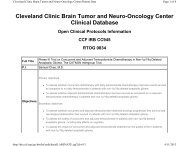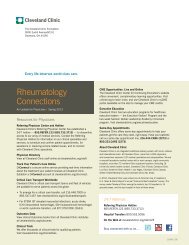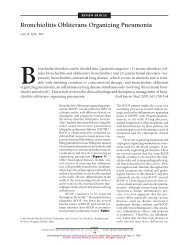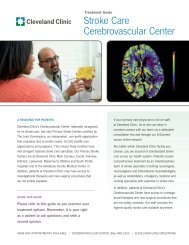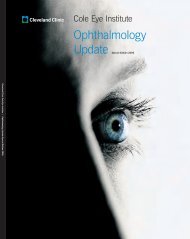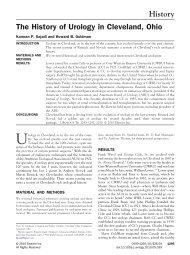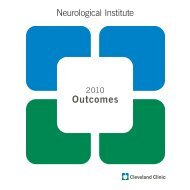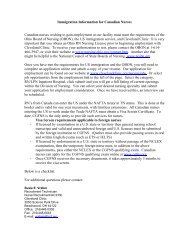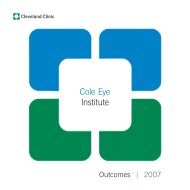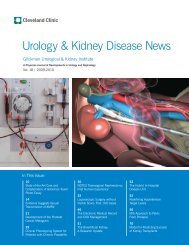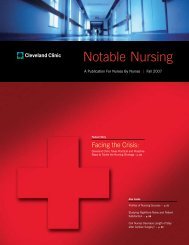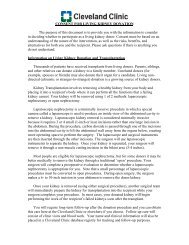Brain Tumor and Neuro-Oncology Center - Cleveland Clinic
Brain Tumor and Neuro-Oncology Center - Cleveland Clinic
Brain Tumor and Neuro-Oncology Center - Cleveland Clinic
Create successful ePaper yourself
Turn your PDF publications into a flip-book with our unique Google optimized e-Paper software.
2008 ANNUAL REPORT<br />
leadership, within the Department of <strong>Neuro</strong>surgery.<br />
A prime focus is the training of medical students <strong>and</strong><br />
neurosurgery residents, as well as fellows <strong>and</strong> staff, in<br />
open, minimally invasive <strong>and</strong> endoscopic approaches<br />
to the brain <strong>and</strong> skull base, especially the anterior skull<br />
base via transnasal <strong>and</strong> para-sellar approaches.<br />
<strong>Neuro</strong>pathology<br />
<strong>Neuro</strong>pathologists Dr. Richard Prayson, Section Head,<br />
<strong>and</strong> Dr. Susan Staugaitis perform interoperative<br />
consultations <strong>and</strong> final pathologic diagnoses on more<br />
than 600 brain <strong>and</strong> pituitary tumor specimens each<br />
year. More than 450 of these specimens have been<br />
digitally captured for discussion at the BTNC patient<br />
management conferences. All glioma specimens are<br />
evaluated by a panel of ancillary immunohistochemical<br />
<strong>and</strong> molecular tests. The staff of the BTNC has<br />
indicated that the following panel is medically necessary<br />
because it provides additional information for prognosis<br />
<strong>and</strong>/or treatment planning:<br />
WHO Grade I Glioma<br />
• Ki-67 immunohistochemistry (proliferation index)<br />
WHO Grade II<br />
• Ki-67 immunohistochemistry (proliferation index)<br />
• P53 immunohistochemistry (surrogate marker for<br />
p53 point mutation)<br />
Molecular Diagnostic Test Volume (Reporting Period 1/1/2008-12/31/2008)<br />
Specimen Class Total 1p<br />
FISH<br />
Total 19q<br />
FISH<br />
• Fluorescence in situ hybridization (FISH) for<br />
evaluation of allelic loss of chromosomes 1p <strong>and</strong> 19q<br />
• (FISH for evaluation of Epidermal Growth Factor<br />
Receptor amplification is performed on WHO Grade II<br />
gliomas but billed to BTNC Research Account.)<br />
WHO Grade III-IV<br />
• Ki-67 immunohistochemistry (proliferation index)<br />
• P53 immunohistochemistry (surrogate marker for p53<br />
point mutation)<br />
• Fluorescence in situ hybridization (FISH) for<br />
evaluation of allelic loss of chromosomes 1p <strong>and</strong> 19q<br />
• FISH for evaluation of Epidermal Growth Factor<br />
Receptor amplification<br />
• Analysis of 1p <strong>and</strong> 19q using LOH by PCR is<br />
performed on selected cases when this procedure<br />
provides more accurate or additional information.<br />
• Due to low volume of request, sequencing of TP53 is<br />
no longer performed in house, but can be performed<br />
on a “send-out” basis.<br />
• Testing of MGMT promoter methylation is also offered<br />
as a “send-out” test.<br />
Approximately one-third of the 1p/19q FISH analyses<br />
performed are Reference Laboratory procedures<br />
(patients are not BTNC patients at the time of request).<br />
FISH for<br />
EGFR**<br />
1p LOH by<br />
PCR<br />
19q LOH by<br />
PCR<br />
TP53 SEQ Totals<br />
Routine Surgical (SX)* 166 169 149 8 8 0 500<br />
Surgical Outside Review (SO)* 7 8 1 0 0 0 16<br />
Surgical Reference Lab Consult (SRC) 12 12 2 0 0 0 26<br />
Procedure Only (PRS) 94 93 2 1 1 0 191<br />
Totals 279 282 3 0 0 0<br />
* Specimen Classes SX <strong>and</strong> SO are patients treated by BTNC physicians.<br />
** Numbers do not include tests performed on WHO Grade II gliomas billed to research accounts.<br />
17



